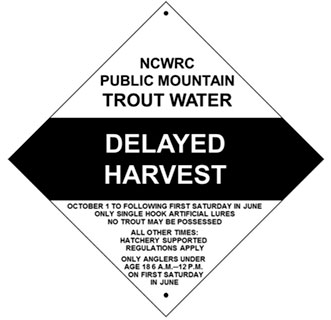
The N.C. Wildlife Resources Commission will open 34 trout streams and two lakes classified as Delayed Harvest to trout harvest on June 1 through Sept. 30.
From 6 a.m. until 11:59 a.m., Delayed Harvest waters are open only to anglers 17 years old and younger. At noon, waters open to all anglers. During this time, anglers can keep up to seven trout per day — with no bait restrictions and no minimum size limits.
Since last fall, Commission staff has stocked more than 382,000 trout in waters designated as Delayed Harvest to provide anglers with better opportunities to catch fish, according to David Deaton, the Commission’s fish production supervisor.
“We stock Delayed Harvest streams in March, April, May and then again in October and November,” Deaton said. “In early summer, when some streams become too warm for trout to survive, we open these stocked streams to allow trout harvest before stream conditions get too warm.”
Delayed Harvest trout waters are posted with diamond-shaped, black-and-white signs.
While fishing, anglers should consider these minimal steps to help prevent the spread of aquatic nuisance species like gill lice, whirling disease and didymo:
- CLEAN equipment of all aquatic plants, animals and mud
- DRAIN water from boats, live wells and equipment
- DRY equipment thoroughly
- NEVER MOVE fish, plants or other organisms from one body of water to another

The Commission established the youth-only fishing period in the morning of “opening day,” which is always the first Saturday in June, to promote trout fishing among young anglers and to provide special opportunities for young anglers to catch and keep fish.
The Commission also supports youth-only fishing opportunities during National Fishing and Boating Week 2019. From late May through mid-June, more than 30 kids’ fishing events will be held throughout the state.
For more information on trout fishing, including a list of Delayed Harvest trout waters, regulation information and trout maps, visit www.ncwildlife.org/trout.